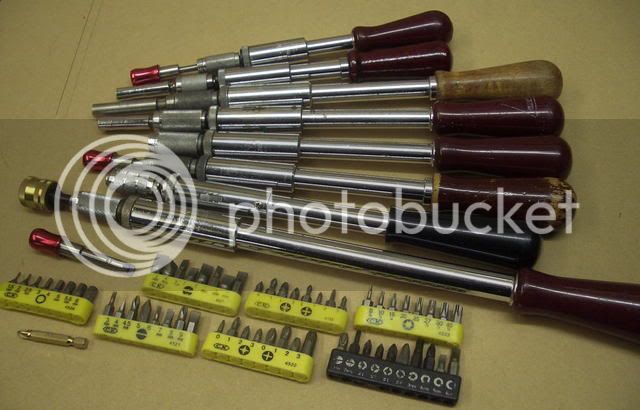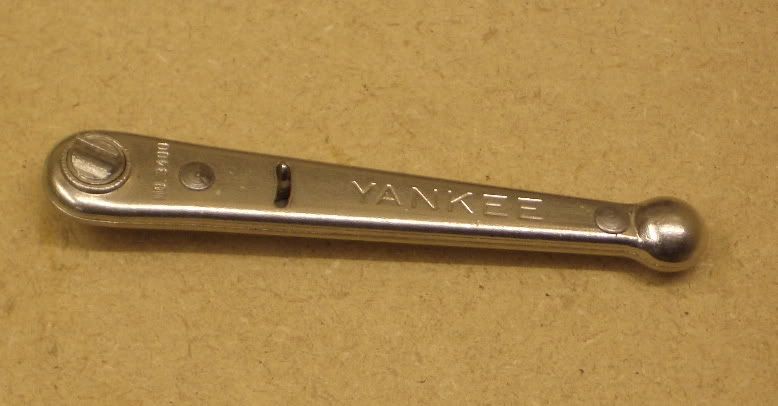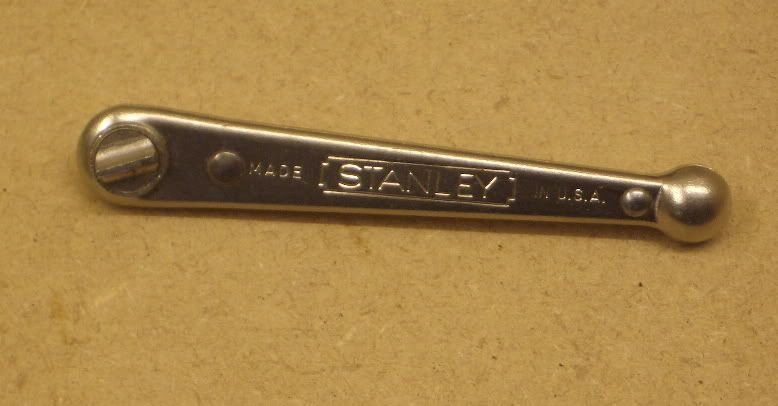Paul Chapman":2t6lkvav said:For most jobs you can't beat a spiral ratchet screwdriver

Cheers :wink:
Paul
You seem to have almost a collection there Paul

Paul Chapman":2t6lkvav said:For most jobs you can't beat a spiral ratchet screwdriver

Cheers :wink:
Paul
Tom K":1odhdup7 said:You seem to have almost a collection there Paul
For opening tins of paint and prying up floor boards - yes certainly! For turning a screw the most important feature is the shape/size of the handle - length of handle doesn't make the slightest difference to leverage.devonwoody":2qx6st5w said:Am I correct in thinking that a long s/d has more leverage than those short ones shown above?



I think possibly...no without a doubt, that Paul's on a steady slide down the 'Slope', not quite up there with Waka or Martin (or meKarl":3kdca1hj said:Tom K":3kdca1hj said:You seem to have almost a collection there Paul
One of many - planes, screwdrivers, honing guides......
And those are just the ones we know of :lol:
Cheers
Karl
I was told that a longer shaft on a screwdriver will be a little springy and so can be used to apply more effort then a short or non spring shaft.promhandicam":gxlm1kw3 said:For turning a screw the most important feature is the shape/size of the handle - length of handle doesn't make the slightest difference to leverage.
Steve
Night Train":hujlpsmw said:I was told that a longer shaft on a screwdriver will be a little springy and so can be used to apply more effort then a short or non spring shaft.promhandicam":hujlpsmw said:For turning a screw the most important feature is the shape/size of the handle - length of handle doesn't make the slightest difference to leverage.
Steve
The theory being that as you apply torque to the handle the energy is stored in twisting the shaft and that adds to the peak torque at the screw head.
Much like Kinetic Energy Recovery Ropes (KERR) used in off road motorsport.
Steve Maskery":1c18tlef said:I have to say that I've never bought into this idea that a longer screwdriver produces more torque. I do, however, think that a longer screwdriver is easier to use. It's more stable in the slot, for a start.
Let's say you've got a wobbly hand when you screw. Your hand moves back and forth a bit, say 1/2". If you've only got a short one, that 1/2" is a long way off straight, but if you have a long one, that 1/2" is neither here nor there.
I think that's where the advantage of a long screwdriver comes in, stability.
S
This was many years ago (1983 I think) when my MV teacher showed me this idea. He had a really tight machine screw in a machine and using a standard length screwdriver neither of us could turn it. He then got out a driver that was nearly 2' long and as he turned it I could see the shaft twist very slightly like a torsion spring and then suddenly the screw gave up the battle and turned.Steve Maskery":wuch581g said:I have to say that I've never bought into this idea that a longer screwdriver produces more torque.
S
Paul Chapman":bu34njui said:Of those spiral ratchet screwdrivers, the largest one drives in screws far more easily than the shorter ones - I love it
Cheers :wink:
Paul
newt":bvbozrjz said:Paul Chapman":bvbozrjz said:Of those spiral ratchet screwdrivers, the largest one drives in screws far more easily than the shorter ones - I love it
Cheers :wink:
Paul
Nice one Paul. However the longer the plunge on spiral rachet screwdrivers the greater the advantage you have, in that once the screw starts to turn, you have overcome the stiction. With a conventional driver you have to overcome stiction every half turn.
Karl":g86ouytx said:Perhaps that explains why, in my experience, more torque (not leverage) can be applied with a longer shafted screwdriver. I use an 18" one all the time - it is the first I go to pick out of my toolbag.
Cheers
Karl
promhandicam":24r8x53u said:The length of the shaft will have no effect on the torque as torque is a measurement determined by the length of a lever, the force applied to the lever and the angle to which the force is applied. This is why spanners become progressively longer as the nut size increases.


newt":39x6slvz said:. . . However, as mentioned a very long shaft could act like a torsion bar and as you applied torque the bar twists and then the rotation of the bit is released suddenly, a bit like an impact driver.
promhandicam":6hqwq2yd said:The length of the shaft will have no effect on the torque as torque is a measurement determined by the length of a lever, the force applied to the lever and the angle to which the force is applied. This is why spanners become progressively longer as the nut size increases. In a large screwdriver it may well be possible to apply more torque as the handle will be proportionally bigger allowing more force to be applied to it compared to a smaller screwdriver. I've got a couple of stubby screwdrivers which because their handles are quite large and fit my hand well are excellent at shifting stubborn screws.
Steve
Enter your email address to join: